Corporate payment cards offer immense convenience and efficiency for businesses, streamlining transactions for regular expenses like travel and dining, and avoiding the use of personal credit cards.
This is especially crucial for startups lacking extensive credit histories. Instead of traditional credit assessments, these cards evaluate creditworthiness based on alternative criteria like funding, performance, and bank balances, ensuring startups get financial flexibility that aligns with their specific needs and situations.
Now, several companies offer corporate payment cards. Ramp is one such company and is on a mission to help time-pressed business owners grappling with the intricate details of their company’s expenditures.
In this article, we will go into extensive detail about what Ramp is, what you must know about the Ramp credit card, and if it is right for you.
What is Ramp?

Ramp is a U.S.-based financial technology company representing a significant evolution in the corporate credit card landscape. Co-founded by Glyman and Atiyeh, who previously created a consumer finance startup focused on price protection, Ramp was born from the innovative idea of creating a credit card that actively helps businesses spend less money.
Recognizing that meticulous analysis of expenses can be a time-consuming task, often resulting in missed opportunities for significant savings, the Ramp card offers a solution — It employs advanced proprietary technology to scrutinize spending made on the card, effectively doing the heavy lifting for the business owner.
Founded in 2019 and launched in 2020, Ramp stands out in the fintech sector for its unique approach to business spending with an annual processing of over $13 billion in payments, saving its clients over $400 million since its inception. By August 2023, Ramp had attained a valuation of $5.8 billion, reflecting its rapid growth and impact in the fintech space.
To know if Ramp is right for you, here are 10 essential facts about the Ramp credit card that will help you make up your mind.
1. Real-Time Expense Reporting
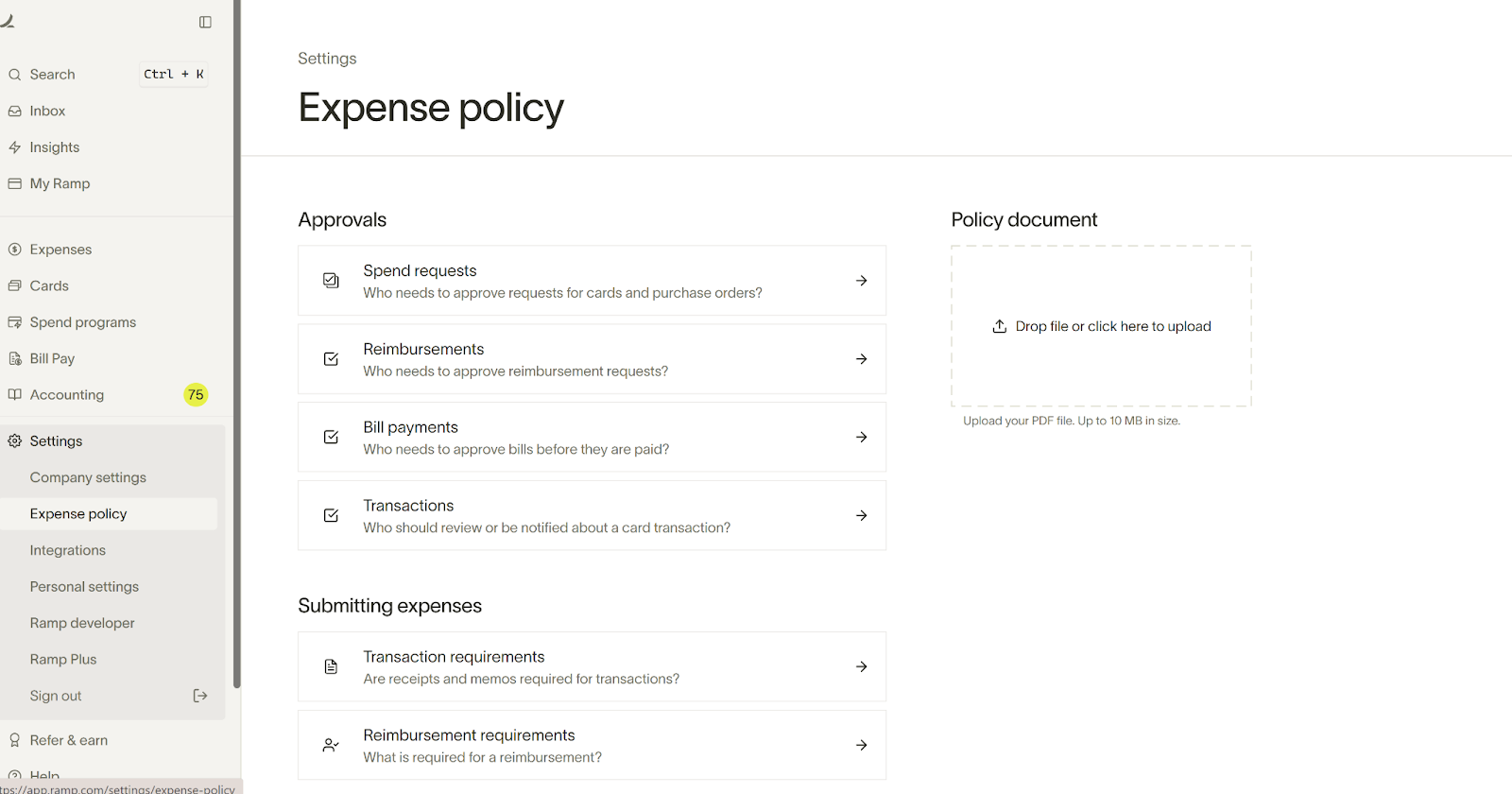
Ramp’s real-time reporting feature allows companies to view their expenses immediately as transactions occur, ensuring up-to-date financial data is always at their fingertips. Additionally, through Ramp’s cloud-based software, businesses can not only track and review expenses but also manage employee spending effectively.
It also identifies cost-saving opportunities, like eliminating duplicate subscriptions, and simplifies the complex task of monitoring and controlling company-wide expenses, making budget management more efficient and effective.
2. High Spending Limits
Ramp stands out in the business credit card market, particularly for startups and new businesses, by offering exceptionally high credit limits – up to 20 times higher than those offered by conventional business credit cards. This feature addresses a common challenge faced by startups: limited access to substantial credit due to their lack of extensive credit histories.
Ramp approaches creditworthiness differently. It forgoes the traditional credit check during the application process. Instead, Ramp assesses a company’s credit limit based on its current financial status, specifically the cash balance linked to the Ramp account. And if you’d like to access loans that can carry over to the next month, Ramp can team corporations with vetted lending partners to help secure business and SBA loans.
3. No Personal Guarantee Required
Ramp significantly diverges from the norm in the business credit card industry by not requiring a personal guarantee from business owners – a feature particularly relevant and beneficial for startups and small businesses.
In the traditional business credit card application process, it’s common for issuers to request the business owner’s Social Security number. This practice typically implies that the owner is personally guaranteeing the debt of the company.
The implications of this can be far-reaching: any missed or late payments on the company’s card could impact the owner’s personal credit report. More critically, in the event of a business defaulting on its debt, the card issuer could pursue consumers’ personal assets, including significant properties like a home, to recover losses.
However, with the Ramp corporate card, this risk is mitigated. This is because Ramp does not require a personal guarantee from the business owner. This policy provides a significant layer of protection for entrepreneurs.
In the unfortunate event that a business encounters financial difficulties or fails, having a Ramp card means that the personal finances and credit score of the business owner remain separate and protected.
4. Rewards and Cashback
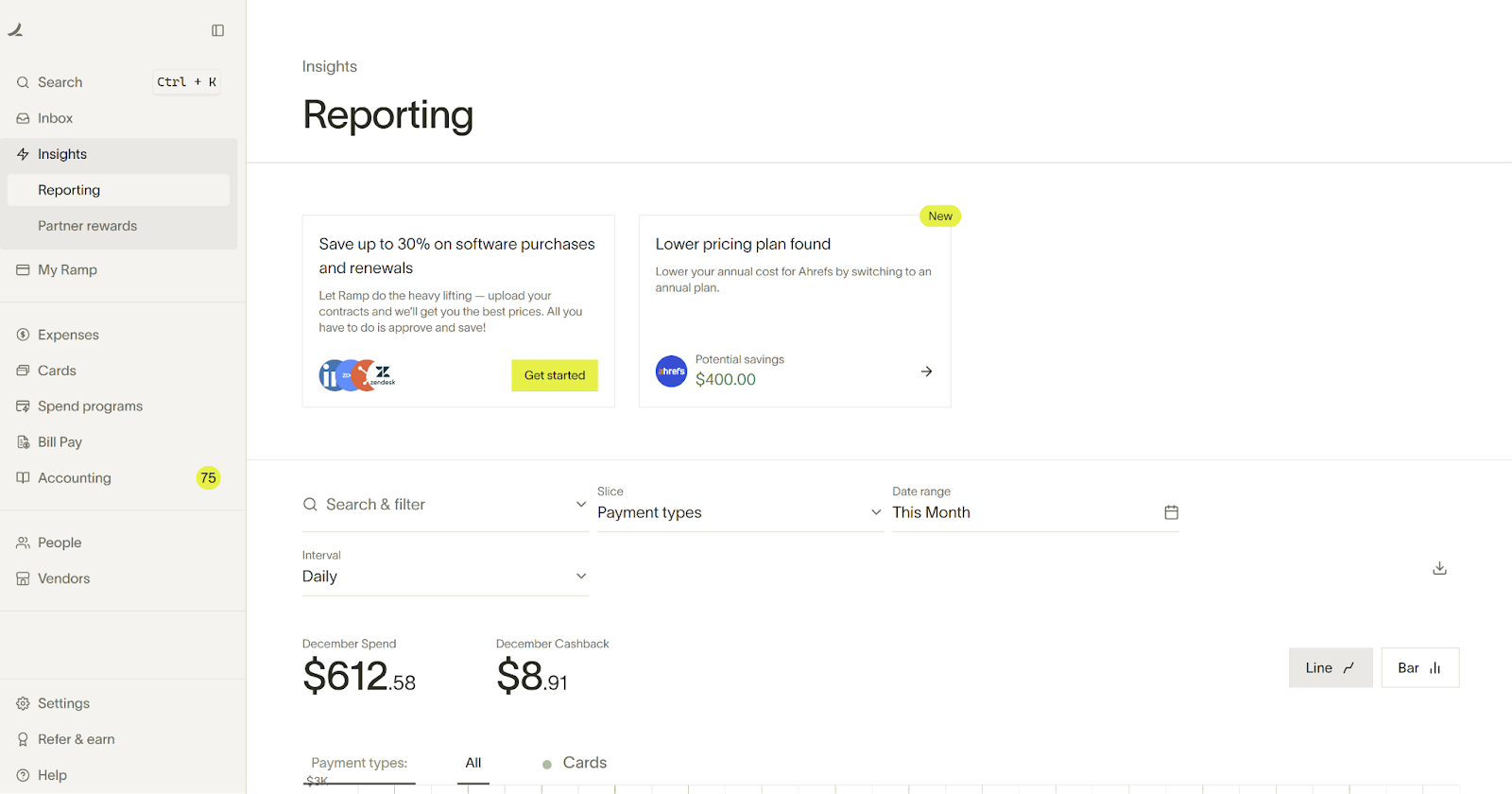
Ramp’s business model is centered around helping companies save money, but it also offers attractive rewards and a cashback program. This program is designed to provide additional financial benefits to businesses while promoting smart spending habits.
The Ramp card distinguishes itself with a straightforward and lucrative rewards system: it offers a flat 1.5% cash back on all purchases. This uncomplicated approach means that businesses earn rewards regardless of the category in which they spend, not to mention the additional savings from discounts and special offers. For startups watching every penny, that means a lot.
5. AI-Powered Expense Management
At the heart of Ramp’s innovative approach is its AI-powered expense management system. This technology excels in detecting inefficiencies like duplicate subscriptions and monitoring supplier price changes, enabling businesses to renegotiate contracts or find cost-effective alternatives.
Additionally, it identifies unclaimed rewards and provides real-time spending trend analysis, giving a comprehensive overview of financial activities. This AI also aids in forecasting future costs, allowing for more informed budgeting and strategic financial planning.
6. Automated Accounting Integration
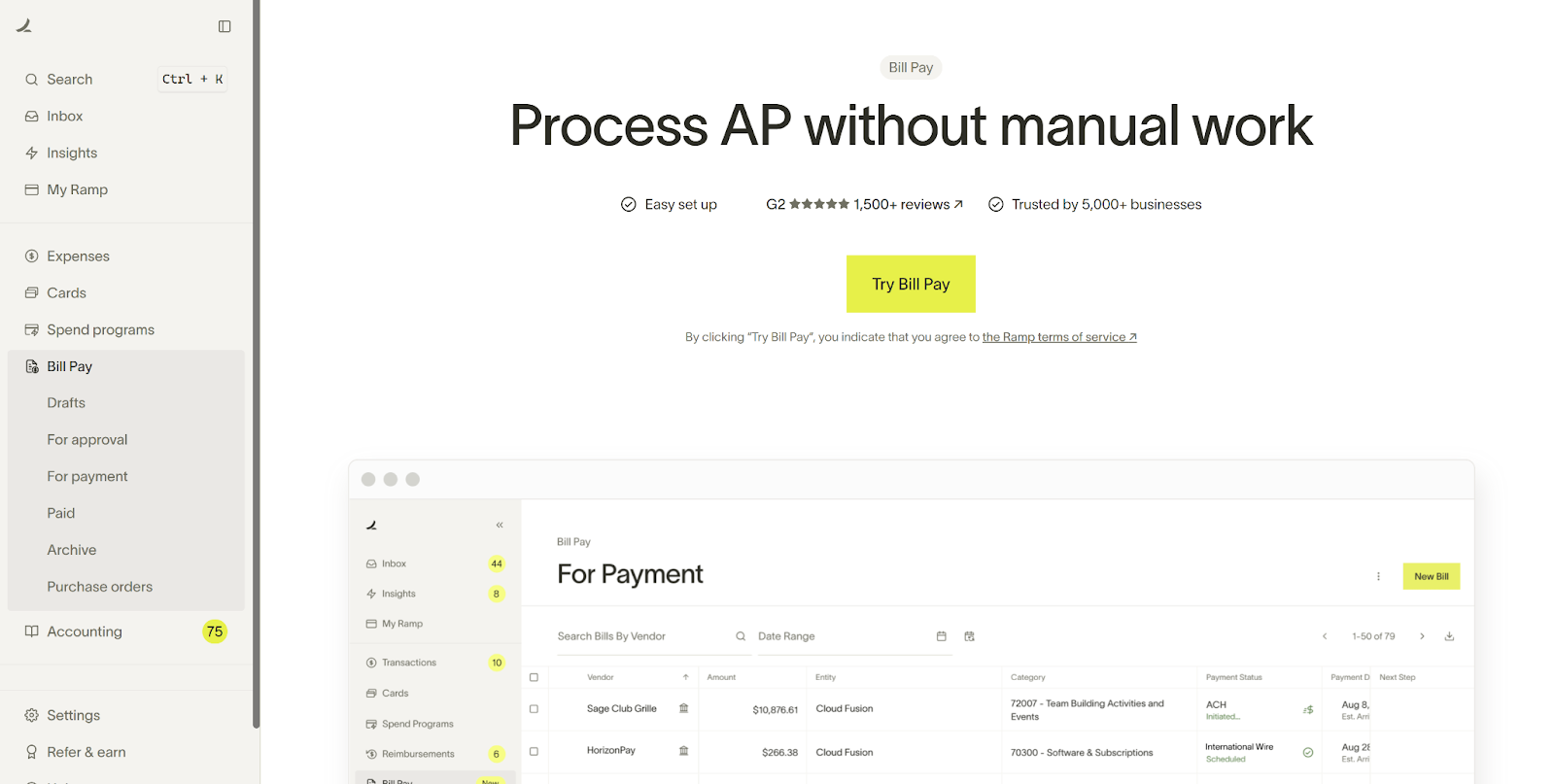
Ramp integration to Bill.com
Ramp’s integration with popular accounting software like QuickBooks and NetSuite significantly streamlines business accounting processes. This feature addresses a common challenge faced by small and medium-sized businesses: the tedious and time-consuming task of manual expense report processing.
By automatically collecting and matching receipts to transactions at the time of purchase, Ramp simplifies the entire process. Users can submit receipts via SMS or email, and Ramp’s system efficiently matches them to the appropriate expenses, reducing manual effort and the potential for errors.
This seamless integration extends to automating tasks such as expense categorization and account reconciliation. By creating custom rules within Ramp’s platform, businesses can ensure consistent and accurate recording of expenses.
7. No Fees
Unlike many traditional business credit cards, Ramp does not impose the usual array of fees. This means no annual fees, late fees, or foreign transaction fees, which are common with other corporate cards. This absence of fees can lead to substantial cost savings for businesses, especially for those who use their cards frequently for a variety of transactions.
The catch? Well, the Ramp Corporate Card is a charge card, not a typical credit card. This means that the balance on the card must be paid in full each month.
8. Start Free with Ramp
Ramp’s core offering is particularly appealing for its straightforward, cost-free structure. Businesses can start using Ramp’s services without worrying about annual fees or monthly user charges, a significant departure from many other corporate card providers. This fee-less entry point makes Ramp an accessible and attractive option, especially for startups and small businesses keeping a close eye on their expenses.

As businesses grow and their needs evolve, Ramp offers upgraded plans like Ramp Plus or Ramp Enterprise, catering to more complex financial requirements.
9. Customizable Controls and Limits

Ramp’s corporate card provides extensive customization options, enabling businesses to set tailored controls and limits for employee cards or departments, ultimately enhancing spending oversight and adherence to financial policies. This flexibility allows businesses to adjust card usage based on various roles and responsibilities, ensuring compliance with company policies.
Moreover, these custom controls are not just about setting limits; they also enable businesses to enforce their financial policies more effectively which could include restrictions on certain types of expenditures or limits on transaction values. Such controls are instrumental in maintaining financial discipline across the organization, minimizing the risk of unauthorized or inappropriate spending.
10. Other Valuable Features of Ramp
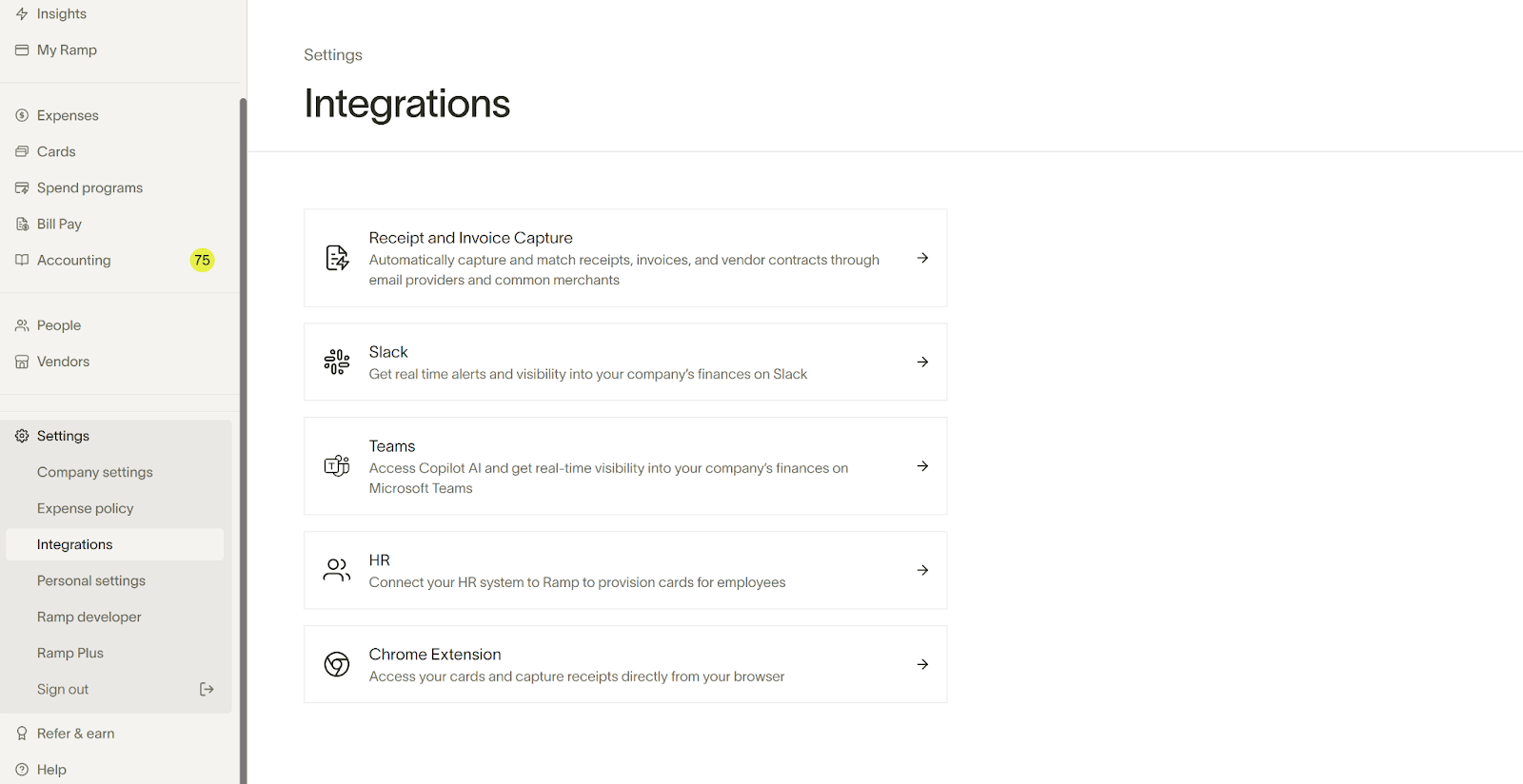
Ramp offers an array of additional features that significantly enhance its utility for businesses, particularly for startups. These features contribute to Ramp’s reputation as an “all-in-one solution” for business financial management.
Slack Integration: Ramp integrates with Slack, providing instant alerts and approval requests for financial transactions. Note that this feature is not part of the basic Ramp subscription.
Fast Setup: Ramp’s system is designed for rapid setup, claiming to have cards operational in less than 15 minutes, catering to time-constrained founders.
Travel Platform: ‘Ramp for Travel‘ allows businesses to set and enforce travel policies, manage travel expenses, and monitor out-of-policy spending in real-time, streamlining travel expense management and ensuring policy compliance.
Pricing
Ramp offers a tiered pricing structure to cater to the diverse needs of startups, each level packed with features designed to streamline financial processes and enhance cost management.
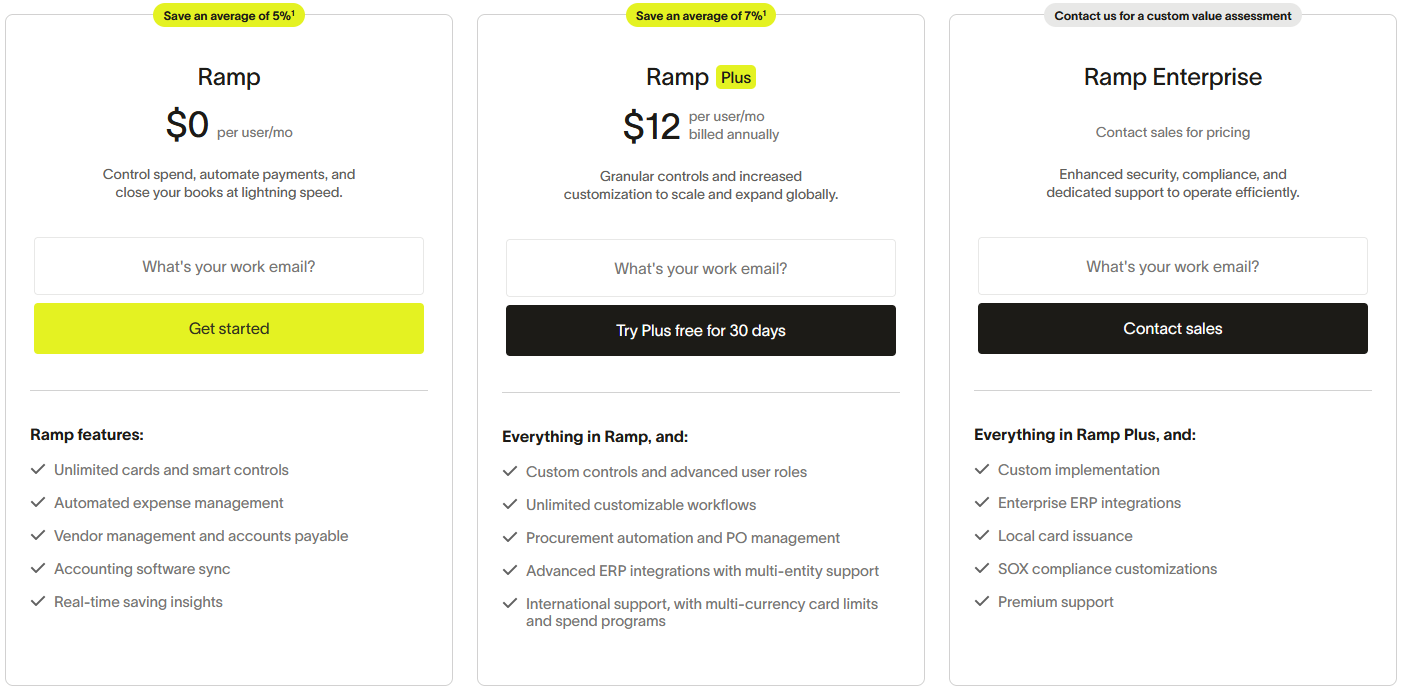
Ramp offers three pricing tiers with varied features to accommodate different business needs:
Essential
This free tier includes key features such as unlimited cards with smart controls, automated expense management, vendor management, seamless accounting software integration, and real-time saving insights.
Plus
Priced at $15 per user/month, this tier adds to the Essential features with custom controls, advanced user roles, unlimited customizable workflows, procurement automation, advanced ERP integrations, and international support.
Enterprise
For custom pricing, contact Ramp Sales. This tier includes all features in Plus, with additional services like custom implementation, enterprise-level ERP integrations, local card issuance, SOX compliance, and premium support.
Brex vs. Ramp: Comparing Two Leaders in Expense Cards for Startups
Overview
Brex Credit Card: Aimed at funded companies, particularly those with venture capital backing, Brex offers a credit card with a strong rewards program and generous spending limits based on a company’s funding and performance.
It caters to the specific needs of VC-backed corporations, offering perks and rewards that align with their operational scale. Brex has also enhanced its offerings with bank-like features, including FDIC insurance on cash deposits, making it an attractive option for well-funded startups.
Ramp Credit Card: Ramp positions itself as a solution for frugality for startups and small businesses. It combines a corporate card with comprehensive expense management tools, including expense report creation, analysis, and policy creation.
Ramp is particularly strong for Series A to Series C companies experiencing rapid growth in expenses across various categories like software and travel. Ramp’s focus extends beyond just offering a corporate card; it emphasizes the entire expense management ecosystem.
Ramp vs Brex

Despite their similarities like seamless integration and valuable discounts, Ramp and Brex differ in their target audiences and service models.
- Brex’s Market Shift: Brex announced its departure from the small business market, focusing instead on startups with professional funding. This shift narrows Brex’s appeal, particularly for bootstrapped or traditional small businesses.
In contrast, Ramp continues to cater to a wider range of businesses, including SMBs. With a requirement of only $75k in the bank to apply for an account, Ramp remains a viable option for small businesses and startups alike.
- Ramp’s Cashback vs. Brex’s Points System: Ramp distinguishes itself with a simple 1.5% unlimited cashback on all purchases, contrasting with Brex’s points-based rewards system.
While Brex incentivizes increased spending to accumulate points, Ramp’s straightforward cashback approach aligns more with prudent financial management, providing direct financial benefits without encouraging unnecessary expenditures.
- Ramp’s Additional Services: Ramp’s acquisition of Buyer, a negotiation as a service company, signifies its commitment to expanding its services around expense management. This move positions Ramp as a more comprehensive solution for startups, especially those navigating rapid growth and escalating expenses.
Is Ramp Right for My Startup?
The Ramp card is an excellent fit for startups focused on efficient financial management and cost reduction. It’s particularly suited for businesses that need to streamline their expenses but lack the time or resources for detailed bookkeeping.
The card’s integrated software acts like a virtual finance team, offering powerful expense management and analysis tools. This capability not only simplifies the process of tracking and controlling expenditures but can also result in significant cost savings by reducing the need for additional finance staff.
Ramp also stands out for startups with solid financial success and does not rely on personal credit history for business financing. The card’s evaluation of creditworthiness based on business financials, rather than personal credit, makes it an attractive option.
It gets even better. Ramp offers an effective solution for businesses seeking financial security. They connect customers with reputable banks, ensuring reliable and dedicated support. Within just the first 48 hours, Ramp helped hundreds of businesses manage over $1 billion in deposits, indicating their efficiency and reliability in financial management.
Furthermore, its straightforward cash-back rewards and valuable discounts on commonly used business services enhance its appeal. For startups aiming to maintain a lean operation while gaining insightful financial oversight, Ramp presents a compelling solution.
Getting Started With Ramp
To apply for a Ramp card, you must:
- Be registered in the U.S. as a corporation, limited liability company, or LP (nonprofits included; individuals, sole proprietors, and unregistered businesses are ineligible).
- Have at least $75,000 in a U.S. business bank account linked to the application.
- Conduct most operations and spending in the U.S., though international transactions are supported with no transaction fees.
- An employer identification number (EIN) is mandatory for application due to legal compliance.
- Business owners or officers without a social security number (SSN) can apply by providing a foreign passport (using the last four digits or a placeholder for alphanumeric numbers) and proof of address (utility bill, bank statement, pay stub, signed lease agreement, mortgage statement, or insurance statement).
- Have a business email address.
If you’d like a complete breakdown of these credentials and their purposes, you can check Ramp’s page here for more info.Once you have all those credentials settled, you can visit the Ramp to get started on the registration process. Once you are done registering, you can follow their detailed guidelines on the onboarding process for both admins and employees.
Editorial Process:
Our reviews are created by a team of experts who have real-world experience with the products and services we write about. We take great care in our editorial process to ensure that our reviews are fair, thorough, and helpful.
Please note that some of the links in the article may be affiliate links, which means we may receive compensation if you decide to purchase a paid plan or to sign up for the service. These products and/or services are ones we have personally used and stand behind.
Please be aware that this website is not intended to provide financial advice. You can find our affiliate disclosure in our Terms of Use.
